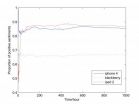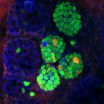(Press-News.org) This news release is available in German.
Adolescents with antisocial personality disorder inflict serious physical and psychological harm on both themselves and others. However, little is yet known about the underlying neural processes. Researchers at the University of Leiden and the Max Planck Institute for Human Development have pinpointed a possible explanation: Their brain regions responsible for social information processing and impulse control are less developed.
The study focused on incarcerated delinquent adolescents from the Netherlands aged between 15 and 21 years who had been diagnosed with an antisocial personality disorder. The researchers had the adolescents play the mini-ultimatum game. In this cooperative game, which simulates fairness considerations, the player is offered a sum of money by another player. The player is also told whether the opponent could have made a fairer offer or had no alternative. Brain activity during the game was measured using functional magnetic resonance imaging (fMRI). By comparing the findings with those of a control group of nondelinquent adolescents, the researchers were able to determine what was going on in participants' brains in the context of fairness considerations.
"No" to unfair offers
The delinquent adolescents showed less activation than the control group in the temporoparietal junction and in the inferior frontal gyrus. These areas of the brain are responsible for functions including the ability to put oneself in another person's position and impulse control. In both groups, the researchers observed similar levels of activation in the dorsal anterior cingulate cortex and in the anterior insula – areas of the brain associated with affective processes. The findings indicate that although both groups showed the same levels of emotional reactivity to unfair offers, the delinquent adolescents rejected these offers more often. In contrast to the control group, they did not take account of their opponent's intention – or of whether their opponent had no alternative.
What do other people think?
Adolescents with antisocial personality disorder thus seem to have difficulties in taking into account all the relevant information in social interactions, such as other people's intentions. The researchers hypothesize that this in turn leads to more antisocial behavior. "Adolescence is a time of multiple physical, neurological, and social changes. This study with adolescents offers us a better understanding of what happens during this sensitive phase and how things can go astray, resulting in the development of antisocial behaviors", says Wouter van den Bos, lead author of the study and researcher in the Center for Adaptive Rationality at the Max Planck Institute for Human Development in Berlin. The researchers hope that their findings will help to inform the development of psychotherapeutic treatments.
INFORMATION:
Van den Bos, W. et al.
Neural correlates of social decision-making in severely antisocial adolescents.
Social Cognitive and Affective Neuroscience. DOI: 10.1093/scan/nsu003
Why antisocial youths are less able to take the perspective of others
Neuroimaging study of social interaction with delinquent adolescents
2014-03-11
ELSE PRESS RELEASES FROM THIS DATE:
How Twitter shapes public opinion
2014-03-11
WASHINGTON D.C., March 11, 2014 -- How exactly does Twitter, with its 241 million users tweeting out 500 million messages daily, shape public opinion?
That question was tackled by a group of researchers in China who investigated how opinions evolve on Twitter by gathering about 6 million 140-character-or-less messages that were tweeted out over a six month period in the first half of 2011. They ran these messages through computer algorithms that sorted them by topic ("iPhone 4" or "blackberry," for instance), and they analyzed the underlying sentiments of the authors ...
Soil microbes shift as shrubs invade remnant hill prairies
2014-03-11
URBANA, Ill. – Perched high on the bluffs of the big river valleys in the Midwest are some of the last remnants of never-farmed prairie grasslands. These patches, edged by forest, are slowly being taken over by shrubs. A recent University of Illinois study examined the soil microbes on nine patches, also called "balds," that had varying degrees of shrub invasion and found an interesting shift in the composition of the microbial community.
"When we looked at the soil samples from a lightly encroached hill prairie remnant, it was very clear that there was a set of fungi ...
Tracking neighborhood eating habits to promote healthier diets
2014-03-11
Poor food choices, such as overconsumption of carbonated soft drinks, are an important factor driving the global obesity epidemic and have been linked directly to diabetes and heart disease. While public health agencies are working to help people to make healthier choices, monitoring the effectiveness of these efforts has been costly and difficult. But now, using the same digital data employed by marketers to promote food products, McGill University's David Buckeridge has developed a way for health agencies to track Montreal consumers' food choices, neighborhood by neighborhood. ...
NASA saw some power in Tropical Cyclone Gillian before making landfall
2014-03-11
VIDEO:
The TRMM Satellite's Precipitation Radar data was used to create this 3-D flyby over Tropical Cyclone Gillian on March 10. Some powerful storms within Gillian reached heights above 16 km/~9.9...
Click here for more information.
NASA's TRMM satellite saw some towering thunderstorms in Tropical Cyclone Gillian before it made landfall over the Western Cape York Peninsula of Queensland, Australia. Gillian has been staying over land since, and is now a remnant low pressure area. ...
Higher levels of CSF alpha-synuclein predict faster cognitive loss in Parkinson disease
2014-03-11
Philadelphia, PA, March 11, 2014 – The course of Parkinson disease (PD) can vary from gradual deterioration to precipitous decline in motor or cognitive function. Therefore identifying predictors of progression can benefit understanding of PD disease progression and impact management. Data from 304 PD patients followed for up to 8 years indicate that patients with higher cerebrospinal fluid (CSF) alpha-synuclein levels experienced faster cognitive decline in the following months, although no associations were found between alpha-synuclein levels and motor changes. The results ...
Cellular alchemy: Penn study shows how to make insulin-producing cells from gut cells
2014-03-11
PHILADELPHIA — Destruction of insulin-producing beta cells in the pancreas is at the heart of type 1 and type 2 diabetes. "We are looking for ways to make new beta cells for these patients to one day replace daily insulin injections," says Ben Stanger, MD, PhD, assistant professor of Medicine in the Division of Gastroenterology, Perelman School of Medicine at the University of Pennsylvania. Transplanting islet cells to restore normal blood sugar levels in patients with severe type 1 diabetes is one approach to treating the disease, and using stem cells to create beta cells ...
Gesturing with hands is a powerful tool for children's math learning
2014-03-11
Children who use their hands to gesture during a math lesson gain a deep understanding of the problems they are taught, according to new research from University of Chicago's Department of Psychology.
Previous research has found that gestures can help children learn. This study in particular was designed to answer whether abstract gesture can support generalization beyond a particular problem and whether abstract gesture is a more effective teaching tool than concrete action.
"We found that acting gave children a relatively shallow understanding of a novel math concept, ...
Education boosts brain function long after school
2014-03-11
European populations are growing older on average, a trend that could pose serious challenges to health care, budgets, and economic growth. As a greater proportion of a country's population grows into old age, average cognition levels and national productivity tend to decline, and the incidence of dementia increases.
"Finding ways to improve the cognition of seniors is of central importance to the economic well-being of aging countries," says IIASA researcher Vegard Skirbekk, who worked on the study with researchers Nicole Schneeweis and Rudolf Winter Ebmer at Linz University
The ...
Researchers closer to improving safety, effectiveness of lithium therapy
2014-03-11
Tampa, FL (March 11, 2014) – Lithium, one of the oldest and most widely used drugs to treat neuropsychiatric illnesses, such as bipolar disorder, has a serious drawback – toxicity. In a continued effort to find a safer form of lithium, researchers at the University of South Florida (USF) have discovered that lithium salicylate, an alternative salt form, might be the answer.
The researchers found that oral lithium salicylate produced steady lithium levels up to 48 hours in rats without the toxic spike associated with the rapid absorption of current FDA-approved lithium ...
What's the upside of feeling too sad for chocolate?
2014-03-11
The instant gratification and the pleasure derived from consuming excessive chocolate and deep-fried foods can lead way to a double-edged sword of negative consequences ranging from weight gain to feelings of low self-esteem. According to a new study in the Journal of Consumer Research, combating this type of self-destructive behavior may be achieved simply by making a person feel sad.
"We found that when people who are sad are exposed to pictures of indulgent food or indulgent words, their sadness highlights the negative consequences of indulging and encourages them ...
LAST 30 PRESS RELEASES:
How AI tools like DeepSeek are transforming emotional and mental health care of Chinese youth
Study finds link between sugary drinks and anxiety in young people
Scientists show how to predict world’s deadly scorpion hotspots
ASU researchers to lead AAAS panel on water insecurity in the United States
ASU professor Anne Stone to present at AAAS Conference in Phoenix on ancient origins of modern disease
Proposals for exploring viruses and skin as the next experimental quantum frontiers share US$30,000 science award
ASU researchers showcase scalable tech solutions for older adults living alone with cognitive decline at AAAS 2026
Scientists identify smooth regional trends in fruit fly survival strategies
Antipathy toward snakes? Your parents likely talked you into that at an early age
Sylvester Cancer Tip Sheet for Feb. 2026
Online exposure to medical misinformation concentrated among older adults
Telehealth improves access to genetic services for adult survivors of childhood cancers
Outdated mortality benchmarks risk missing early signs of famine and delay recognizing mass starvation
Newly discovered bacterium converts carbon dioxide into chemicals using electricity
Flipping and reversing mini-proteins could improve disease treatment
Scientists reveal major hidden source of atmospheric nitrogen pollution in fragile lake basin
Biochar emerges as a powerful tool for soil carbon neutrality and climate mitigation
Tiny cell messengers show big promise for safer protein and gene delivery
AMS releases statement regarding the decision to rescind EPA’s 2009 Endangerment Finding
Parents’ alcohol and drug use influences their children’s consumption, research shows
Modular assembly of chiral nitrogen-bridged rings achieved by palladium-catalyzed diastereoselective and enantioselective cascade cyclization reactions
Promoting civic engagement
AMS Science Preview: Hurricane slowdown, school snow days
Deforestation in the Amazon raises the surface temperature by 3 °C during the dry season
Model more accurately maps the impact of frost on corn crops
How did humans develop sharp vision? Lab-grown retinas show likely answer
Sour grapes? Taste, experience of sour foods depends on individual consumer
At AAAS, professor Krystal Tsosie argues the future of science must be Indigenous-led
From the lab to the living room: Decoding Parkinson’s patients movements in the real world
Research advances in porous materials, as highlighted in the 2025 Nobel Prize in Chemistry
[Press-News.org] Why antisocial youths are less able to take the perspective of othersNeuroimaging study of social interaction with delinquent adolescents





